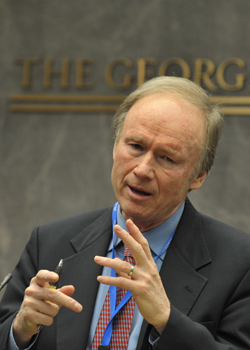Happiness and the Law, a new book by Professor Christopher Buccafusco and colleagues John Bronsteen (Loyola University Chicago) and Jonathan Masur (University of Chicago), was published by the University of Chicago Press in December. Below, read an excerpt from Jack Silverstein’s Chicago Daily Law Bulletin profile on the authors and the project (“The pursuit of (studying) happiness”):
You are a criminal defense attorney with a client weighing two options: Accept a plea deal and an automatic five years in prison or go to trial and risk receiving a sentence of 20 years. Your client decides to go to trial.
Is the client wrong? According to three Illinois law professors and coauthors of a new book examining the impact of laws on happiness, the answer is no.
“Our research shows that 20 years in prison is not nearly four times as bad as five years,” said Jonathan Masur, a professor at University of Chicago Law School.
That is among the conclusions in the new book “Happiness and the Law,” written by Masur, John Bronsteen of Loyola University Chicago School of Law and Christopher J. Buccafusco of IIT Chicago-Kent College of Law.
The book … is the result of six years of work between the three professors as they set out to create metrics for evaluating laws based on happiness.
“If you think about why we have law, at all, the basic core reason is to make people’s lives better,” Bronsteen said. “If you want to think about how law affects people and how to make law better, you need to think about what it means to improve people’s lives.”
To study happiness, the professors combed pre-existing research such as the General Social Survey, a survey founded in 1972 that tracks people’s happiness and quality of life over many years by asking them to respond to questions about themselves.
“Our contribution in the book, then, is basically to take these findings and use them to challenge and update more traditional ways of thinking about legal problems—economically and philosophically,” Buccafusco said.
The survey is an example of hedonic psychology, the attempt to quantify happiness.
“It’s the notion that we can detect and discover what we would call ‘subjective well-being,’” he said.
Read the full profile here.



Leave a Reply